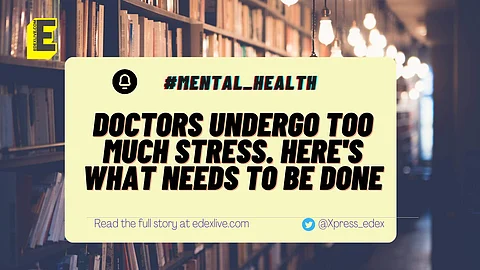

The recent suicide of a first-year Junior Resident (JR-1) at Dr Ram Manohar Lohia Institute of Medical Sciences (RML) in Lucknow has brought attention to the growing issue of mental stress among doctors. This incident, along with a similar one reported a week ago at Gandhi Medical College (GMC) in Bhopal, highlights the need for healthcare institutes and the government to take action and implement measures to address this issue, which has seen an increase in suicide cases in recent years. Medical experts and students are calling for action to be taken to curb these tragic incidents.
Experts and students agree that the workload on Resident Doctors (RDs) is the major problem. "They work a 40-50 hour duty per week, without proper sleep or food. This overworking takes a toll on their mental and physical health which leads to depression, and then students resort to extreme steps," said Dr Deepak Suman, Senior Resident, Cardiology, Safdarjung Hospital, New Delhi, and Chief Advisor of FAIMA (Federation of All India Medical Association).
"There is also the lack of a friendly environment," he added. "These students stay away from their families, and they have to balance studies with work. There is also competitive pressure. These factors also take a toll on their mental health," said Dr Deepak Deepak Kumar, Vice-President, FAIMA and Senior Resident, Orthopedics, RML. Recently, several RDs from the Maulana Azad Medical College and Lok Nayak Medical College, New Delhi, have reported harassment at the hands of a professor, pointed out Dr Manish Jangra, a founding member of FAIMA.
Words of a Junior RD
Dr Sarthak Vats, JR-1, Psychiatry, Institute of Mental Health and Hospital, Agra, says, "The system of rigorous hierarchy in most medical colleges and glorification of long working hours, unhealthy sleeping and eating habits are the root cause of psychiatric illness in most RDs of the country, especially among JRDs." He adds that most of the time, Senior Residents do not consider the mental and physical health of their juniors, citing similar treatment they received when they were juniors.
"This mindset is dangerous in the health system. And psychoeducation should be done among the medical community, so that this tradition can be stopped" he stays further.
Immediate solutions needed
According to Dr Deepak Suman, it is crucial to address the current situation by increasing manpower and fairly distributing work hours. He also advocates for a positive work environment with supportive senior colleagues. Dr. Deepak Kumar emphasizes the importance of not only academic collaboration but also support from students' families, including providing good food and comfortable housing. He also suggests incorporating extra-curricular activities for student recreation.
"The administration should be empathetic. Strict rules and vigilance for the working hours of doctors should be followed. International protocols for working hours and duty hours should be administered and followed. Also, regular counselling of doctors should be ensured," says Dr Sarthak. This is where the experts feel the government should step in.
"The government can come up with measures to conduct regular counselling classes. An open discussion is important," Dr Deepak Kumar says. "It may seem difficult, but since the workload situation cannot be avoided, doctors have to come out and talk. Many doctors undergoing health issues resort to self-medication. This should be avoided. They should talk to other doctors and get help. This way suicide cases can be avoided," said Dr Om Prakash, Professor of Psychiatry and Deputy Medical Superintendent, Institute of Human Behavior and Allied Sciences (IHBAS) New Delhi.
What else can be done?
Dr Om Prakash says that it needs to be understood why there is so much workload, in order to treat the root cause. He states, "In India, primary healthcare institutions, including household healthcare machinery, have lost utility. In 1946, the Bhore Committee suggested a health system for India with a vision for primary, secondary and tertiary health systems in place. But this is no longer being followed. People run to premium institutes like AIIMS even for mild ailments."
This results in a huge number of patients in hospitals and situations where a single doctor has to handle about half a hundred patients arise. "Many students prefer not to work in government hospitals due to this. Stress and suicide thus are not uncommon. Even psychiatrists resort to this step," he says. He adds that despite the stress, society expects more from the doctor.
"If I give an example of my counterpart in the UK, he attends only 4-5 patients a day, while I attend about 40-50. And he says he feels stressed. But here, the society questions me why I don't attend to the 51st patient," Dr Prakash said further. "Realising the vision of the Bhore Committee, which was based on Western models, is a viable solution for the long run," he added.
